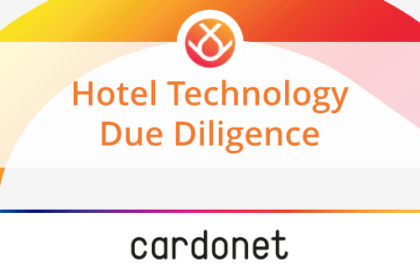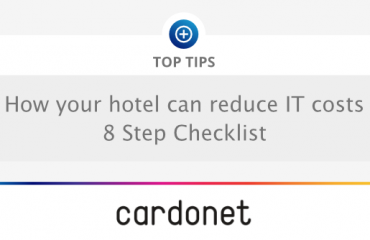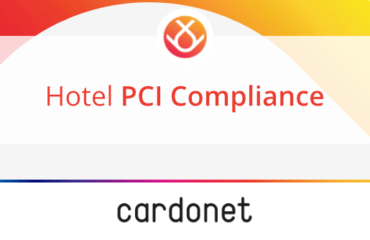
A hotel can’t run well without up-to-date and effective technology. Gone are the days of handwritten logbooks and ‘analogue’ check-ins.
Having outdated or broken technology is about as bad as having leaky pipes and bad insulation – both make your guests’ stay less pleasant, and their return less likely.
Conducting a technology due diligence on the hotel that you’re considering buying will help you avoid these pitfalls.
That might seem like a strange comparison to make, but good technology has become the bedrock of smooth hotel operations. Hotel technology might refer to the systems that control your reservations or property management, or the Wi-Fi used by staff and guests – either way, if it isn’t running well, your employees will have to spend valuable time fixing unnecessary issues, and your guests’ stays will be peppered with difficulties.
Because hotel technology is as important as it is, you must be sure it’s up to scratch before you buy a hotel. Due diligence is the process of ensuring that what you are buying has the value of what you are going to pay. Whether you’re new to hospitality and looking to purchase your first or are planning to expand your current portfolio, it’s a vital aspect of any acquisition.
Traditional hotel due diligence would refer to quality checking the following components
- Legal due diligence: Is the hotel involved in any ongoing court cases? Is it following all compliance regulations?
- Technical due diligence: Is the building safe? Are the piping and electric wiring up to standard?
- Market due diligence: Is this the right location to own a hotel? What is the competition like? What sort of clientele should you expect?
In addition to these, though, you should undertake a technology due diligence for any potential purchase.
Conducting a hotel technology due diligence exercise
If you’re not familiar with hotel operations, you might underestimate the role that technology plays.
When conducting due diligence on any technology used by a hotel, these are some red flags you should look for:
- The IT is outdated. Like with any other industry, hospitality technology seems to advance at light speed. You want to make sure you know if the technology being used is outdated. If it is, you can begin to sketch out how you are going to update it. While there’s not always the business case to make sure you have the newest of every technology that you use, it’s good practice to have a sense of how the current technology compares to what is on the market.
- The staff don’t know how to use it. Top-of-the-range tech is only as good as its users. Your technology due diligence should take account of how competent the staff is at using it. Once you’ve done this, you’ll know what upskilling you’d have to provide so that your technology can be used to its full potential.
- The IT is not cost-effective. Effective hotel technology is valuable, and that sometimes comes with a hefty price tag. A lot of the time that price-tag is worth it, but you may be able to find some financial inefficiencies in the hotel’s technology strategy – for example, is it paying for software licenses that it does not use?
- It’s not integrated. Hospitality technology varies in use, and it’s likely that the hotel you’re considering will use multiple technology packages for different purposes. The best-case scenario is that the front-office and back-office tech is integrated for seamless operations.
Let’s take a look at where your focus should be when conducting a technology due diligence.
Hotel Software Due Diligence
Much of the technology you’ll find in a hotel today is software-based, although some still requires physical technology infrastructure to run. Here are two major components you can expect to find:
Revenue management
Hotel Revenue management systems are essential to a modern hospitality business. This is back-office technology that allows you to have an efficient and accurate view of how you should be pricing your rooms. A good revenue management system will work through information such as historical trends, market data, and your hotel’s specification to give you the price that best matches what your customers will want to pay with what is most profitable for your business.
Property management
With hotel property management software, you have a central digital hub for the day-to-day operations of your hotel. You’re able to manage reservations, bookings, online availability, pricing, and much more, in one place. Your technology due diligence should determine if the hotel has an effective property management system and whether it meets your future brand standards. A good property management system will significantly reduce the operational headache of a new business once you’re running.
Hotel Hardware Due Diligence
These systems have to run on good hardware. Even though the biggest advancements are coming in the form of software, you can’t take full advantage of these advancements unless you have devices that can run them seamlessly.
Imagine this: a potential client has arrived in your lobby to book a room for the night. The receptionist logs into your state-of-the-art reservation system, but the decade-old computer crashes. They try again and are met with the same result. The potential client decides to go to the hotel down the road.
This is, obviously, not great for business. The worst part is that it is completely avoidable. When conducting technology due diligence, be sure to investigate the state of the physical equipment – are there enough computers, and do they run well? Where computers can be replaced with tablets, have they been? Or will this cost fall on your shoulders as the new owner?
Also look at physical servers and the network to understand when a refresh is needed and what would be required at that point.
Pitfalls of not conducting a hotel technology due diligence exercise
You might be convinced that in an ideal world, conducting a technology due diligence when purchasing a hotel would be beneficial, but can’t justify the cost. That’s understandable – any acquisition of this kind is already very capital intensive, and money should be saved where it can be.
That being said, the potential cost of not ensuring the technology is up-to-scratch could be huge. Even if you buy a hotel for a great price in an unbeatable location, outdated and clunky technology will become a burden to your business.
In this scenario, you’ll be left with two choices. You could leave the technology as is, which would create a frustrating work environment for your staff, and a hassle for your guests. That means fewer repeat customers and low employee retention.
Or you could perform the necessary upgrades. That means the potentially hefty technology bill will fall at your feet and turn what was a sweet deal sour.
Who should conduct your hotel technology due diligence?
Hospitality is a specialist industry, as is the technology associated with it. If you want to acquire a hotel, you should use a company that knows the ins and outs of the business and understands what a strong (and weak) technology package looks like.
As exciting as buying a hotel is, it’s also a daunting process. You want to be able to be confident that you know exactly what you’re walking into in every facet of the business.
One last thing: technology due diligence adds value to your transaction. With a reliable, experienced, and trustworthy technology partner at the helm of the process, you’ll be able to find undervalued hotels with strong technology packages, as well as know when a purchase is going to end up being far too expensive once technology costs are considered. You’ll be able to spot value where others can’t.
Cardonet can be that technology partner. We provide expert IT support to hospitality businesses and have two decades’ experience doing so. We know what to look for and can help you throughout the acquisition process.
If you’re looking to acquire a hotel and want to find out more about technology due diligence, reach out to us today on +44 203 034 2244 or +1 323 984 8908. Alternatively, you can contact us online.
We provide 24/7 coverage throughout the United States, United Kingdom and Europe.



You must be logged in to post a comment.